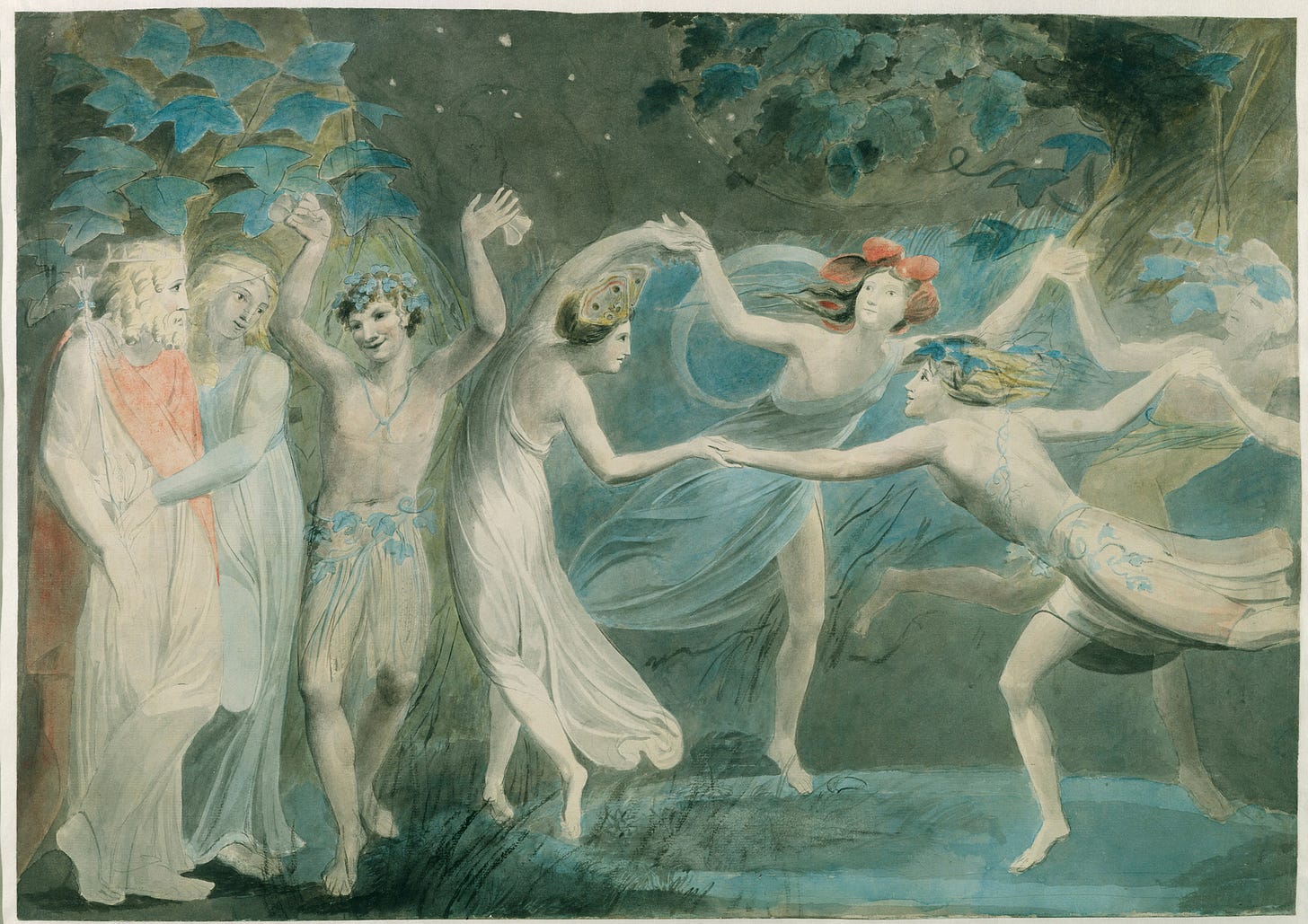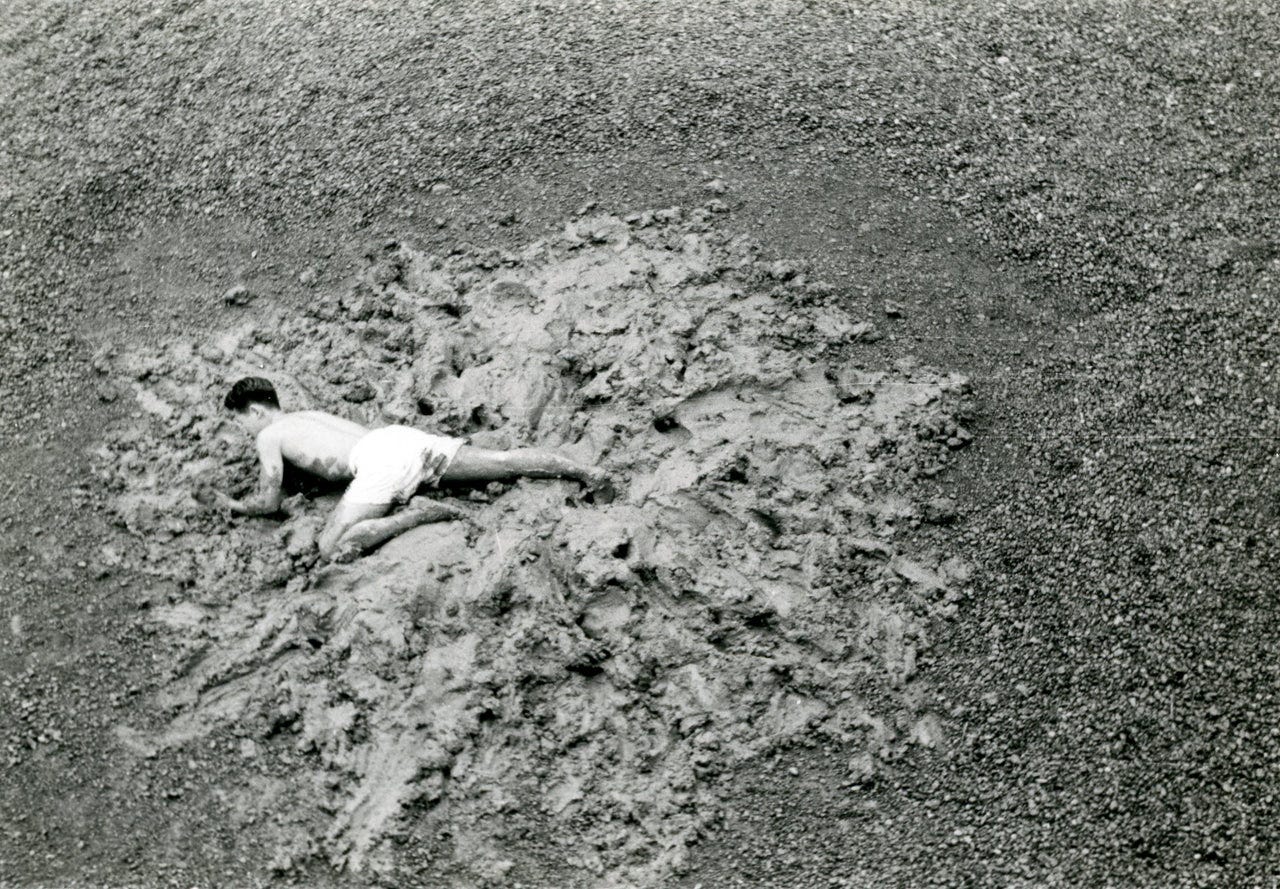Dear Django,
So nice to see you the other week and have a proper catch up. Have you moved flat yet? Hope second year of drama school is treating you well so far — can’t wait to hear all about the intimacy classes. (I might be wrong, but I looked up that interview I read with the I May Destroy You / Normal People Intimacy Co-ordinator — is she at Mountview?)
On the subject, I thought you might enjoy this Donald Antrim short story ‘An Actor Prepares’ as much as I did. Discomfiting, absurd, depraved, it’s got that Nabokovian fic-about-fiction vibe, complete with an unreliable, smart-aleck narrator, the Dean of Student Affairs and Drama teacher Reginald, 48, who casts himself in A Midsummer Night’s Dream as a teenager alongside his students.
The bit that got me is when his alcoholic girlfriend Carol swings by rehearsals to talk costume design.
She held the faerie sketches—Cobweb, Peaseblossom, Moth, and Mustardseed—up in glaring overhead light. A girl wearing shorts and a T-shirt object: “No way. I’m not going out there naked.”
“This is the theater, honey. The character is naked, not you.”
“Good point, Carol,” I interjected, unwisely.
It’s got the ring of a classic 90s sitcom one-liner (the story was published in The New Yorker in 1999), and it’s funny because it’s true — both to the story’s themes of vulnerability and abuse of power and to the idea that to make something and put it out there does require some degree of nakedness, that you reveal something of yourself.
What’s more, Reginald is no stranger to the concept. Having previously produced an all-male, all-nude version of Taming of the Shrew, this is hardly the edgiest work he’s staged on campus.
The story opens with a long finnicky sentence that sees Reginald noodling over Lee Strasberg, ‘the great teacher of the American Method’, and his advice ‘never to “use”— for generating tears, etc., in a dramatic scene—personal/historical material less than seven years in the personal/historical past.’ This ‘material, being too close, as it were, might overwhelm the artist’ and ‘if, in other words, the performer remains trapped in affect long after the character has moved on to dinner or the battlefield—when this happens, then you can be sure that delirious theatrical mayhem will follow.’
I hope it’s not too much of a spoiler, then, to say that Antrim is good on his word and much delirious, slapstick carnage does follow. A lot of revolves it around the set, a pit dug in the ground, entropic as a black hole. First up, it rains. Obviously. Later, there’s a moment in the mayhem where Reginald:
felt free and young. I should say that I felt myself backsliding to a younger state of mind. It’s hard to say what this feeling consisted in – panic and hope, disappointment, shame. I was wearing torn Barry Bears gym shorts and feeling like a teenager and running fast and my feet sank into the earth and mud splashed my legs. What is more disorientating than adolescence?
Listening to Olivia Rodrigo’s new album I was reminded of the answer to Reginald’s question: nothing. She asks all the big questions. On ‘Teenage Dream’, ‘They all say that it gets better / It gets better, but what if I don't?’ At our age or at Reginald’s age, you’re crying ‘O, Olivia, it does, you will!’ Yet it’s also all too human to pine for those days again occasionally, for a world where things aren’t so certain and serious. What’s beautiful in Antrim’s story is the way the mud provides slippage between the two worlds.
Ironically, the story plays out one of R.’s earlier dramaturgical assertions that ‘the pit will illustrate mankind’s proximity to the abyss’, because both Olivia’s teenage hopes/doubts and his resistance to ageing glance off the same chasmic thought: that we only get one shot at living, this is it, and there are no rehearsals. (Unless you’re Nathan Fielder.)
Antrim’s prose itself softens once it gets going too: that first sentence is so awkward and technical, so built up with punctuation as scaffolding, full of dashes, slashes, abbreviations, semicolons, commas and brackets. Then, as the story continues, the paragraphs become more mouldable and you can sense Antrim enjoying the mud splashing his legs. There is a lot of mileage in the pun on ‘backsliding’, which — i just looked it up — also had religious connotations in the 1500s (lapsing into pre-conversion habits or falling into sin): out goes doctrine and over-preparation and in comes instinct.
Any short story about acting will become about the act of writing. Of course, all this also reminds me of the conversation we were having about the different acting styles of Succession’s Brian Cox and Jeremy Strong — the classical On and Off switch vs. The Method — and how that maps onto writing, easily dipping in and out of it or needing to immerse yourself in a bubble, the whole while not being anxious or an arsehole. By the way, did you see Cox parodying his own hatred of method acting on Jimmy Kimmel? If not, see 05:20 here — ‘Hi, I’m Brian Cox and this is my MasterClass on the craft of acting. Tip #1: Just fucking do it! Act! Say the fucking lines and don’t bump into the fucking furniture.’
The way the fucking furniture spawns out of nowhere (along with a Cousin Greg-ish character who seems likely to bump into it) puts a lot of bite into Cox’s bark. Don’t Bump Into the Furniture also strikes me as fun advice for writing too — at least better than the old adage Write What You Know, which has always struck me as a little cult-y in the same vein as The Method.
I can remember hearing this in my first creative writing class at uni and thinking, erm, nope. There was no way I’d be able to write like Ian McEwan (looool) by writing what I knew because I hadn’t really lived yet and I didn’t want to wait until I had. Naturally, I wrote a story about a Viagra addict who suffers a massive priapism. A (confused) way to spite my tutor and prove a point. God, it was bad.
Of course, there is the kernel of useful in the phrase ‘write what you know’, but since we’re in the business of word accuracy, Jeffrey Eugenides put it way better in The Guardian recently (in a piece reflecting on The Virgin Suicides) when he said he writes ‘by paying attention to the world at large and by seeing myself for what I am: an embodied soul, specific, created, neither the main subject nor the person in charge.’
Eugenides understands writing to involve embracing your own finitude, whereas when I heard ‘Write What You Know’, I reckon eighteen-year-old me was on some level afraid I’d be outed for my scarcity of experience — like I’d turned up to a painting academy with no paint.
If only I’d asked myself then, ‘in what sense is living a life like telling a story?’ as psychoanalyst Adam Phillips does in his essay The Telling of Selves. ‘It is the continuity of our life-stories that we use to conceal the past,’ he continues, but ‘through free-association the patient's story loses its composition and becomes more like a collage in which our favourite words unwittingly find alternative contexts.’
I’m interested in this idea that telling stories — ‘baring one’s soul’ — can actually conceal parts of yourself from yourself. I suspect the reason I felt like I needed to be a Jeremy Strong immersed in his bubble when writing a novel and a light switch Brian Cox when I write poems and short essays has something to do with concealment.
I was surprised recently to find George Saunders speaking in such psychoanalytic terms about this recently:
A story always has a problem; something that makes it feel, early on, that we’ve gotten off on the wrong track. It feels misshapen or odd or somehow lacking; it has an insoluble logical issue; we see that, in choosing to tell the story this way, we are sacrificing all sorts of other frequencies, and so on.
At that point, we often do this transference thing, where we feel we must be doing something wrong or even that we are the thing that’s wrong – the one moron in the history of writing who can’t come up with a good ending (or a decent voice, or a compelling plot, or whatever). (If only we weren’t so fundamentally off, we could do this thing correctly.)
But I’ve come to think of this self-remonstration as a form of avoidance. It’s somehow easier to berate ourselves and pronounce that we’re no good (that the problem is all with us, with our personality, our deficient training or background, our psychology, whatever). But it’s harder, maybe, to roll up our sleeves and try to cheerfully re-conceptualize “problem” as “momentary condition/nodule of potential.”
This struck a chord — the idea of a feedback loop of avoidance masquerading as the need for bubble-like immersion?? But I only have a muddy understanding so far. ‘They all say that it gets better / It gets better, but what if I don't?’ It seems I’ve got some more backsliding to do.
Anyway, same again soon please — hanging out on a terrace, but let’s hope the dude playing ‘Wonderwall’ and not knowing the words stays home next time.
Much love,
Sammi x











Love this sm, thank you!
this was soo fun to read, being somewhat of a smol theatre and poem person myself! so many ideas to unpack!! soo glad i discovered this substack, excited to get into the Django lore :'D